by Michael Dimock
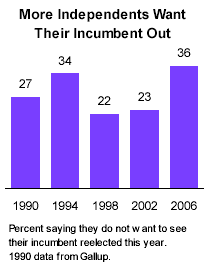 The recent reports about corruption on Capitol Hill have not resonated widely with the public. But the allegations swirling around Congress may be fueling the political discontent of independents, who are unhappy with Congress in general and, in many cases, with their own representative in particular.
The recent reports about corruption on Capitol Hill have not resonated widely with the public. But the allegations swirling around Congress may be fueling the political discontent of independents, who are unhappy with Congress in general and, in many cases, with their own representative in particular.
Last month, 36% of independent voters said they don’t want to see the incumbent in their district reelected. This is as high as in October 1994 (34%), shortly before the historic 1994 midterm when Democrats lost control of Congress.
Anti-incumbent sentiment is also up among Democratic voters – 31% today believe their representative should not be reelected compared with around 20% in previous midterms, including 1994 when the GOP gained control of Congress.
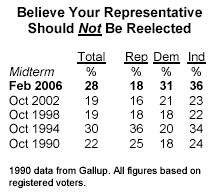 There is, however, no increase in anti-incumbent feelings among Republican voters, just 18% of whom say their representative should not be reelected.
There is, however, no increase in anti-incumbent feelings among Republican voters, just 18% of whom say their representative should not be reelected.
Still more widespread among independents is the belief that their own member of Congress is guilty of taking bribes.
More than half of independent voters (55%) hold that view, compared with just 35% of Republicans and 34% of Democrats.
The taint of scandal also matters more to independents than it does to Republicans and Democrats.
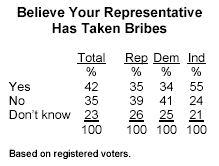 Independent voters who think their member has taken bribes are more than twice as likely as those who do not (46% vs. 20%) to say he or she should be voted out of office this November.
Independent voters who think their member has taken bribes are more than twice as likely as those who do not (46% vs. 20%) to say he or she should be voted out of office this November.
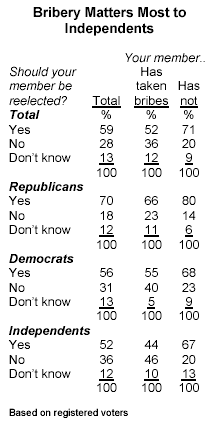 The issue has less of an effect on partisans: A striking 66% of Republicans as well as 55% of Democrats still want to see their member returned to office even if they believe he or she has been involved in accepting bribes from lobbyists.
The issue has less of an effect on partisans: A striking 66% of Republicans as well as 55% of Democrats still want to see their member returned to office even if they believe he or she has been involved in accepting bribes from lobbyists.
Political Implications
In Pew’s latest congressional horserace, Democrats held an overall lead of 50%-41% among registered voters – thanks in large part to the party’s strength among independents. Independent voters favored the Democratic candidate by 51%-32%. That represents a major shift from a comparable point during the run-up to the last midterm election, when independents were divided in their voting preferences (42% Republican/39% Democrat).
However, independents generally see the problem of corruption in Congress as a bipartisan failing. Nearly half of independent voters (46%) volunteer that the Democratic and Republican parties are equally implicated in corruption and bribery in Congress. Fewer see either the Republican Party (28%) or the Democratic Party (7%) as more involved in corruption.
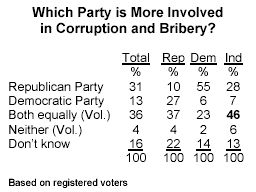 Democrats do hold an underlying image advantage among independents – 43% of whom view the Democratic Party favorably compared with 34% who see the GOP favorably. And by two-to-one (40%-21%) more independent voters trust the Democrats to do a better job of reforming government in Washington. But the party’s leadership has not inspired a great deal of enthusiasm among independents. About one-in-three (35%) see the Democratic Party as having better political leaders, while about the same number (34%) prefer Republican leaders (16% volunteer that neither party has good political leaders).
Democrats do hold an underlying image advantage among independents – 43% of whom view the Democratic Party favorably compared with 34% who see the GOP favorably. And by two-to-one (40%-21%) more independent voters trust the Democrats to do a better job of reforming government in Washington. But the party’s leadership has not inspired a great deal of enthusiasm among independents. About one-in-three (35%) see the Democratic Party as having better political leaders, while about the same number (34%) prefer Republican leaders (16% volunteer that neither party has good political leaders).
Corruption News Influences Voters
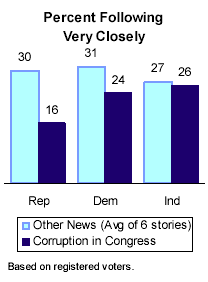 Thus far, public attention to news about lobbyist Jack Abramoff’s Washington dealings and other ethics scandals in Congress is fairly modest. However, anti-incumbency sentiment runs much stronger among those who have been closely following this story, and that is especially the case among independent voters.
Thus far, public attention to news about lobbyist Jack Abramoff’s Washington dealings and other ethics scandals in Congress is fairly modest. However, anti-incumbency sentiment runs much stronger among those who have been closely following this story, and that is especially the case among independent voters.
As a general rule, independents tend to follow news stories less closely than their partisan counterparts. But independents’ interest in news about corruption in Congress is on par with interest among Democrats, and exceeds Republicans’ interest in these reports.
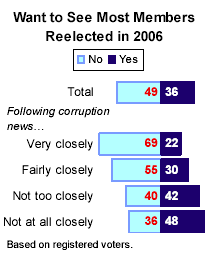 Overall, 69% of voters who are closely following reports about corruption say most members should not be reelected in 2006, far more antagonism than among people who are less engaged in the story. And among independents, these feelings are even stronger. Fully 77% of independent voters who are closely tracking this news story believe most members should be voted out this fall.
Overall, 69% of voters who are closely following reports about corruption say most members should not be reelected in 2006, far more antagonism than among people who are less engaged in the story. And among independents, these feelings are even stronger. Fully 77% of independent voters who are closely tracking this news story believe most members should be voted out this fall.


